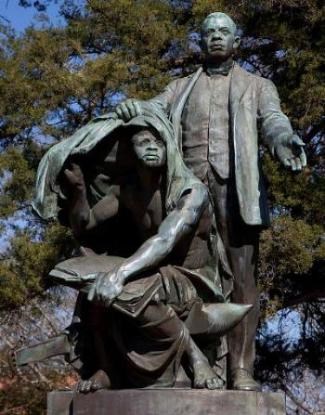xoxodede
Superstar
Did you all know about this?
Could this bill help our reparations push?
I think using the funding in this bill - we could work on pulling together programs, information and data to help for a greater push for reparations.
It can also help us get Monuments, Markers, Documentaries, Research and funding for our schools and communities.
Some ideas that come to mind are:
-------------------------
H.R.1242 - 115th Congress (2017-2018): 400 Years of African-American History Commission Act
Public Law No: 115-102 (01/08/2018)
(This measure has not been amended since it was passed by the House on May 1, 2017. The summary of that version is repeated here.)
400 Years of African-American History Commission Act
(Sec. 3) This bill establishes the 400 Years of African-American History Commission to develop and carry out activities throughout the United States to commemorate the 400th anniversary of the arrival of Africans inthe English colonies at Point Comfort, Virginia, in 1619.
The commission must:
(Sec. 7) The commission must prepare a strategic plan and submit a final report to Congress that contains a summary of its activities, an accounting of its received and expended funds, and its recommendations.
(Sec. 8) The commission shall terminate on July 1, 2020.
(Sec. 9) All expenditures of the commission shall be made solely from donated funds.
Source(s):
H.R.1242 - 115th Congress (2017-2018): 400 Years of African-American History Commission Act
President Donald J. Trump signs H.R. 560, H.R. 1242, H.R. 1306, H.R. 1927, S. 1393, S. 1532, S. 1766
Could this bill help our reparations push?
I think using the funding in this bill - we could work on pulling together programs, information and data to help for a greater push for reparations.
It can also help us get Monuments, Markers, Documentaries, Research and funding for our schools and communities.
Some ideas that come to mind are:
- Mandatory AA/Black History Sections or dedicated libraries in our schools and communities
- Museums in Southern States with Slavery legacy. Here's one example: Hanged, Burned, Shot, Drowned, Beaten
- Free Genealogist Network for AADOS - Genealogy specialist that are dedicated to helping AADOS pull together their family tree.
- Revision of all history books to update the Black American story
- Push for mandatory Black History Class in all public and private
- schools
- Push for mandatory Black History Class/Exam for Immigrants
-------------------------
H.R.1242 - 115th Congress (2017-2018): 400 Years of African-American History Commission Act
Public Law No: 115-102 (01/08/2018)
(This measure has not been amended since it was passed by the House on May 1, 2017. The summary of that version is repeated here.)
400 Years of African-American History Commission Act
(Sec. 3) This bill establishes the 400 Years of African-American History Commission to develop and carry out activities throughout the United States to commemorate the 400th anniversary of the arrival of Africans inthe English colonies at Point Comfort, Virginia, in 1619.
The commission must:
- plan programs to acknowledge the impact that slavery and laws that enforced racial discrimination had on the United States;
- encourage civic, patriotic, historical, educational, artistic, religious, and economic organizations to organize and participate in anniversary activities;
- assist states, localities, and nonprofit organizations to further the commemoration; and
- coordinate for the public scholarly research on the arrival of Africans in the United States and their contributions to this country.
(Sec. 7) The commission must prepare a strategic plan and submit a final report to Congress that contains a summary of its activities, an accounting of its received and expended funds, and its recommendations.
(Sec. 8) The commission shall terminate on July 1, 2020.
(Sec. 9) All expenditures of the commission shall be made solely from donated funds.
Source(s):
H.R.1242 - 115th Congress (2017-2018): 400 Years of African-American History Commission Act
President Donald J. Trump signs H.R. 560, H.R. 1242, H.R. 1306, H.R. 1927, S. 1393, S. 1532, S. 1766


